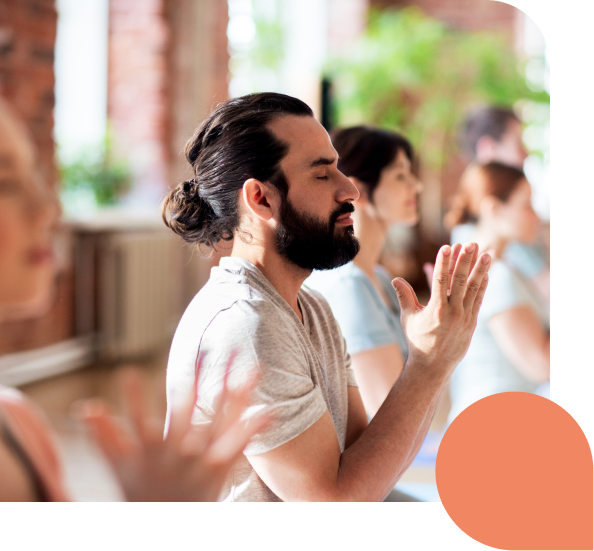An age-old practice gains new significance in the digital era
The earliest recorded references to meditation come from wall art discovered in the Indus Valley near modern day India and Pakistan, dating back between 5000 and 3500 BC. These images depict people sitting cross-legged in what appear to be meditative postures. If these interpretations are correct, it means that people could have been meditating more than 7,000 years ago!
The first text-based references to meditation we have come from the Vedas, which are among the oldest sacred texts in the world. These historic references to early meditative practices are believed to have been written around the year 1500 BC, or about 3,500 years ago.
Beyond these ancient markers, there are also some who believe meditation’s history may date back even further. In fact, some historians theorize that meditation’s origins may trace back to prehistoric times when early humans entered into trance-like states as part of their religious and shamanistic practices. These practices involved rhythmic chanting, repetitive movements, and sensory deprivation to alter consciousness — variations of many of the same elements that make up modern meditation as we know it today.

When it comes to “who first invented meditation,” the truth is that we don’t really know. Most historical evidence points towards ancient India as the birthplace of the practice. But we don’t know which individual actually first developed the art of silent contemplation. Even though many in the West associate meditation with the Buddha, Siddhartha Gautama was not the first person to sit in focused silence. Others may have heard of China’s Lao-Tzu, a philosopher who lived at approximately the same time. But we know meditation predates him as well. Ultimately, just as the historical genesis of meditation is shrouded in mystery, so too is the identity of the original meditator.
While the “inventor” of meditation is unknown, there is one fact about meditation’s history and evolution that is abundantly clear: once it was discovered and properly cultivated, the value and practice of meditation spread rapidly. As time went on and trade routes opened up, meditative teachings quickly flooded through human culture, moving from the East to the West along the network of Eurasian trade routes known as the Silk Road. As this happened, the practice began to take on the qualities of the cultures that adopted it. Thus, we now see many different forms of meditation all over the world, each with their slightly distinct and unique cultural identity.
Meditation has also fully arrived in our modern era as a cornerstone of holistic health and wellness. Meditation reduces stress, improves sleep and energy levels, and promotes greater happiness and life satisfaction. It can be a key component in anyone’s search for greater fulfillment and inner harmony. And while the value of meditation may once have been just anecdotal, a growing body of science and research is giving the practice new weight.
Around the world, academics, scholars, and physicians have begun to study the practice with even greater depth and rigor. New data showing meditation’s benefits to physical and physiological health have begun to emerge with increasing regularity. Businesses, too, are now increasingly offering meditation classes to their employees to reduce stress, improve productivity, and enhance teamwork. Even the general public as a whole has welcomed the act of meditation with open arms.
Fitness-minded folks are experiencing the soothing benefits of meditation during yoga classes. Meditation and self-care are taking a more prominent role in the social media landscape. Community leaders, politicians, and pop culture figures are extolling the virtues of meditation to their followers and supporters. And with all of this expansion, support and endorsement of the practice only continues to grow!
According to recent estimates, there are more than 275 million people in the world that practice meditation today. India tops the chart with 80.7 million people within the country meditating regularly, along with 37.9 million people in the US, and 12.2 million people in China. Globally, studies show that up to 6% of the world’s population meditates!
Here in the U.S., the support of meditation and its benefits has never been greater. According to the Centers for Disease Control and Prevention, the use of meditation more than tripled in the country between the years of 2012 to 2017. Studies also show that up to 14% of Americans have tried meditation at some point recently. People between the ages of 45-64 tend to meditate the most, with women being twice as likely to meditate as men. But don’t count out the younger generations — research also shows that a remarkable 5% of all U.S. children meditate! In fact, between the years of 2012 and 2019, the number of children meditating increased by upwards of 800%!

There’s no better way to understand your emotions and gain a greater sense of self than through the act of meditation. The practice is a dynamic tool to ease your mind after a long day or to recharge your batteries when times get tough. Whatever your goals or wherever you are in your life journey, meditation can be an asset in creating a more fulfilling, rewarding, and balanced existence.
Whether you’re looking to live a healthier life or simply trying to find a practical way to gain greater balance and meaning in life, meditation is something we can all benefit from. It’s an ideal way to become a better version of who you already are.
The world can be fast, and scary at times. There’s so much going on — and so much to take on — that our health and happiness can sometimes get lost along the way. But meditation offers a path to greater balance and peace. Find a quiet place, close your eyes, take a deep breath, and be still. You will thank yourself later! And as you sit quietly, even if you’re in a space all by yourself in the middle of the night, remember that you’re joining with thousands, if not millions, who are meditating along with you at that very same moment!


Powered by AdsRole